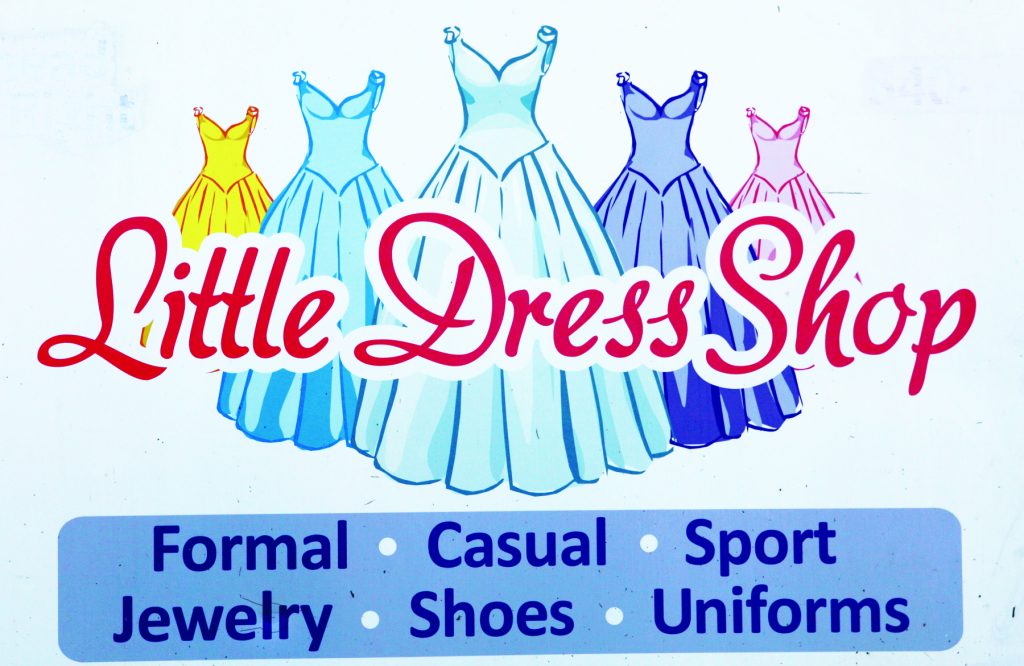
by Vickie Holt
The year was 1944. Douglas and Ruby Gray were enjoying the first years of their lives together as the proprietors of Gray’s General Store, located at 214 Floyd Highway South, just two minutes’ drive from the main stoplight in downtown Floyd. Douglas and Ruby were also the proud new parents of baby Mary.
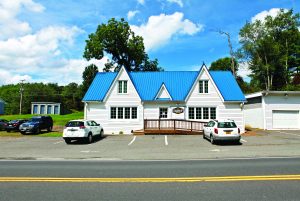 The building that housed the general store had an apartment on the second floor where the family made their home. This is where baby Mary spent the first eighteen months of her life while her parents were busy downstairs. One day, however, little Mary had an adventure. She got tired of staying in her baby bed, so decided to get up and move around. Ruby had heard her daughter walking about, and it was decided that Mary might best off downstairs. Though Mary spent more and more time with her parents in the store, she could still be spotted occasionally looking out of the upstairs window. Mary fondly remembers her mother telling her how everyone in Floyd would wave at her as they passed by. When Mary was five years old, Douglas and Ruby had their hands full. In addition to running a business, they also had to keep their eyes on a mischievous little girl. For a laugh, Mary recalls she would sometimes sneak into the back to smash the farm-fresh eggs on the cement floor. She would also tear holes in the loaves of bread.
The building that housed the general store had an apartment on the second floor where the family made their home. This is where baby Mary spent the first eighteen months of her life while her parents were busy downstairs. One day, however, little Mary had an adventure. She got tired of staying in her baby bed, so decided to get up and move around. Ruby had heard her daughter walking about, and it was decided that Mary might best off downstairs. Though Mary spent more and more time with her parents in the store, she could still be spotted occasionally looking out of the upstairs window. Mary fondly remembers her mother telling her how everyone in Floyd would wave at her as they passed by. When Mary was five years old, Douglas and Ruby had their hands full. In addition to running a business, they also had to keep their eyes on a mischievous little girl. For a laugh, Mary recalls she would sometimes sneak into the back to smash the farm-fresh eggs on the cement floor. She would also tear holes in the loaves of bread.
In 1950, when Mary was six, the family rented out the store and moved to a nearby farm. Ruby, however, continued to work in the store for the new proprietor. Throughout her school years, Mary was an ongoing presence at the general store, staying there with her mother after school, and during the summers.
After graduating, Mary went to Bridgewater for a year to study physical therapy, but returned when her mother suffered a broken leg. Since her father was still responsible for twenty-five head of dairy cattle on the farm, Mary felt it was her duty to help the family. While away at school, she had done haircuts for her fellow students. This inspired Mary to abandon her career as a physical therapist and go to beauty school.
After completing beauty school, Mary married Bobby Gardner on August 7, 1965. That same year, Mary moved into the old general store, the property still owned by her family, to set up her beauty shop, Mary’s.
The next few years were happy ones for Mary. Since Ruby helped at the salon by shampooing the customers, Mary was still able to spend a lot of time with the mother she loved so much. Even more happiness came when Mary and Bobby welcomed their new son, Bobby, and then their daughter, Elizabeth. History was repeating itself. As Mary had grown up in that building while her parents worked, it was now Bobby and Elizabeth’s turn.
 In 1974, a small rack of dresses was added to the beauty shop. Ruby had often mentioned how much she thought she’d like to sell clothing, and since this mother and daughter were a team, Mary agreed. After obtaining a four-foot rack and a selection of dresses from various clothing factories, the Little Dress Shop was born.
In 1974, a small rack of dresses was added to the beauty shop. Ruby had often mentioned how much she thought she’d like to sell clothing, and since this mother and daughter were a team, Mary agreed. After obtaining a four-foot rack and a selection of dresses from various clothing factories, the Little Dress Shop was born.
Mary recalls what a great saleswoman her mother was. “Even to this day,” says Mary, people talk about how Ruby would tell customers whether their selections looked good on them or not. Her opinion was valued, because she was candid and honest. The addition of the dress rack was popular with customers. Demand for the clothing grew quickly, and it wasn’t long before the single rack at Mary’s just wasn’t enough. The decision was made to expand into an apartment that connected on one side of the beauty shop’s building. Mary’s family already owned the property, so it didn’t take long to line the walls with racks and fill those racks with more dresses.
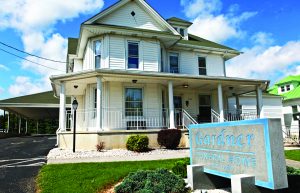 If a beauty shop, a growing clothing business, and a new family wasn’t enough to keep Mary busy, her husband, Bobby, decided to purchase the big house at 202 East Oxford Street, just behind the Courthouse in downtown Floyd. Bobby Gardner purchased the house in 1977 with the intention of making a home for his family on the upper level while renting the lower level as an apartment. Just a year later, however, the decision was made to convert the stately house into a funeral home. With only a year of preparation, Gardner Funeral Home was ready to serve the public in 1979.
If a beauty shop, a growing clothing business, and a new family wasn’t enough to keep Mary busy, her husband, Bobby, decided to purchase the big house at 202 East Oxford Street, just behind the Courthouse in downtown Floyd. Bobby Gardner purchased the house in 1977 with the intention of making a home for his family on the upper level while renting the lower level as an apartment. Just a year later, however, the decision was made to convert the stately house into a funeral home. With only a year of preparation, Gardner Funeral Home was ready to serve the public in 1979.
The family, however, still lived upstairs. Mary recalls years of raising her children above the funeral home, rushing up and down the stairs at strange hours as people came to talk or to make arrangements. Despite two other funeral homes in the area, Gardner Funeral Home became a success, and today has expanded from the original home to the house next door, connected by an enclosed hallway built to allow visitors access to both buildings without having to go outside. The interior is beautiful. Visit gardnerfuneralhomefloyd.com for more information and to take the virtual tour.
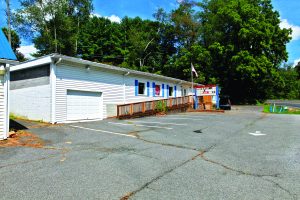 Meanwhile, back at the beauty shop in 1990, Mary decided to close the business and use the space to expand even further with the dresses. The clothing had become so popular that Ruby and Mary wanted to focus on just The Little Dress Shop. The mother and daughter team ran the expanded dress shop as a duo until 1993. That was when Mary’s daughter,
Meanwhile, back at the beauty shop in 1990, Mary decided to close the business and use the space to expand even further with the dresses. The clothing had become so popular that Ruby and Mary wanted to focus on just The Little Dress Shop. The mother and daughter team ran the expanded dress shop as a duo until 1993. That was when Mary’s daughter, 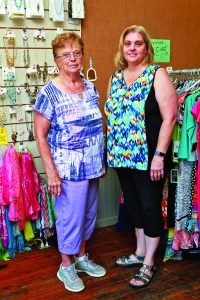 Elizabeth Reynolds, who had been working in Roanoke, continued the family tradition by coming to work with her mother and grandmother. History repeated itself once again. Elizabeth’s children were also now spending their childhood at 214 Floyd Highway South.
Elizabeth Reynolds, who had been working in Roanoke, continued the family tradition by coming to work with her mother and grandmother. History repeated itself once again. Elizabeth’s children were also now spending their childhood at 214 Floyd Highway South.
1993 was also the year that Mary and her family expanded further into an adjacent spot. The building next to the main location is a structure that was actually once part of the original Gray’s General Store, even though it had its own address. Also owned by Mary’s family, this 5500 square foot building located at 204 Floyd Highway South was used as a feed and fertilizer warehouse. Mary recalls the family scraping the floors clean of fertilizer and paneling the walls to make it ready for the clothing and customers. “Nobody would have ever guessed,” says Mary, “that it was any other way.”
With so much space in the old feed building, Mary was able to expand the inventory to include lingerie, casual wear, uniforms and formals, wedding gowns, jewelry, and shoes. At one time, she even stocked children’s clothing and men’s clothing.
It also became necessary for Mary and her family to bring on some helpers. Ogie Rumburg, Esther Trail, Geneva Thomas, and Shirley Moran all became part of The Little Dress Shop’s family. With these ladies lending a hand, Mary, Ruby, and Elizabeth happily travelled all over Virginia, North Carolina, and South Carolina to find the best selections for their customers, as well as the best prices.
The (big) Little Dress Shop was a huge success. In addition to the local regulars, folks would visit two or three times a year from as far away as Florida, New York, and beyond! And when those far-flung fans did drop in, they would be recognized and welcomed like friends.
For a few more years, Mary continued to use the beauty shop space to sell irregular clothing, but eventually rented it to a pawn shop, leaving the old feed warehouse as the sole location for The Little Dress Shop. And perhaps that was meant to be. In 2008, fire broke out on the second floor above the pawn shop, in the apartments where Mary had spent the first years of her life. It wasn’t long, however, before the two upstairs apartments were rebuilt to the original floor plan. And once the downstairs was cleaned up from the water damage, it coincidentally became home to a new beauty shop. Even more coincidentally, the proprietor, Stacy Midkiff Simpkins, had already spent much of her childhood in the building when it was Mary’s! Stacy was Elizabeth’s friend from school days and spent a lot of time visiting Elizabeth in Mary’s Beauty Shop.
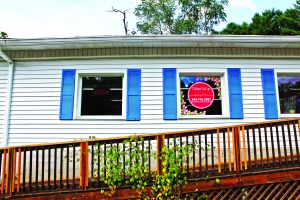 Stacy ran her shop, Sheer Elegance, until health issues forced her to close. Even today, however, 214 Floyd Highway South persists in being a beauty shop! It is now Gussied Up, run by Miranda Bolt.
Stacy ran her shop, Sheer Elegance, until health issues forced her to close. Even today, however, 214 Floyd Highway South persists in being a beauty shop! It is now Gussied Up, run by Miranda Bolt.
Until 2019, The Little Dress Shop was an iconic fixture in a town famous for its tourism. With internet shopping becoming more popular than ever, however, Mary had a difficult decision to make. After forty-five years in business, The Little Dress Shop would close its doors.
By this time, it was just Mary and Elizabeth. In 2014, the family was devastated to lose Ruby at the age of ninety-seven. As Mary recalls, her mother continued to come to the shop each day it was open, up until two weeks before her passing. “…inviting people into the shop and telling them how they looked in the things they were trying on…if it was good or if it was not good.
 In order to liquidate the remaining stock, Mary and Elizabeth decided to move selections of seasonal merchandise to a temporary location closer to downtown. Mary’s father, Douglas Gray, had purchased the small storefront at 111 West Main Street in the 1940’s. Mary recalls that her father walked all the way to Hillsville to make the purchase! Douglas Gray had passed away in 1998, but Mary remembers him fondly as a remarkable salesman. Before buying the general store, he’d been a “huckster”, going door to door with flour, sugar and other items. He would also pick up hams, chickens, eggs, and other goods from the farmers to then sell in Roanoke. Mary chuckles at the story she was told about her father’s aunt sending him candy from Chicago, which he then took to school and sold to the other children. He was a salesman all his life and loved helping the community.
In order to liquidate the remaining stock, Mary and Elizabeth decided to move selections of seasonal merchandise to a temporary location closer to downtown. Mary’s father, Douglas Gray, had purchased the small storefront at 111 West Main Street in the 1940’s. Mary recalls that her father walked all the way to Hillsville to make the purchase! Douglas Gray had passed away in 1998, but Mary remembers him fondly as a remarkable salesman. Before buying the general store, he’d been a “huckster”, going door to door with flour, sugar and other items. He would also pick up hams, chickens, eggs, and other goods from the farmers to then sell in Roanoke. Mary chuckles at the story she was told about her father’s aunt sending him candy from Chicago, which he then took to school and sold to the other children. He was a salesman all his life and loved helping the community.
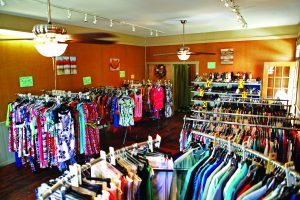 The storefront at 111 West Main has had multiple tenants over the years. Early on, it was a thrift store for the Save the Children Federation. Among other incarnations, it was also a seamstress shop for Velma Spangler, a sewing machine repair shop run by Tyler Turner, a carpet shop run by Donny Black, and an antique shop run by Melody Winger.
The storefront at 111 West Main has had multiple tenants over the years. Early on, it was a thrift store for the Save the Children Federation. Among other incarnations, it was also a seamstress shop for Velma Spangler, a sewing machine repair shop run by Tyler Turner, a carpet shop run by Donny Black, and an antique shop run by Melody Winger.
In June of 2020, however, it became an outlet for The Little Dress Shop’s remaining stock. Mary says that the pandemic has had a definite effect on customer traffic, but she is happy that local Floydians and tourists are still supporting the business. After the Fall and Winter merchandise is liquidated in December, the 111 West Main Street location will also close. The plan is to join the online-shopping trend by creating a website through which to continue selling the formals still in stock at the old feed warehouse building. It has not yet been determined what the site will be called, but Elizabeth tells us it should be online this Fall.
Elizabeth tells us that when the temporary store front closes, she and her husband, Andy, plan to set up a studio and shop where Andy can display and sell his beautiful woodcraft items.
 The old feed building location stores only a fraction of the inventory it once held. Not wanting to let the space go to waste, Mary has recently remodeled and split it into three beautiful spaces. One is occupied by a florist called Tilted Tulip, run by Melissa Goad. The second space will soon be available for rent, and the third will continue, for now, as a storage location for The Little Dress Shop’s remaining inventory.
The old feed building location stores only a fraction of the inventory it once held. Not wanting to let the space go to waste, Mary has recently remodeled and split it into three beautiful spaces. One is occupied by a florist called Tilted Tulip, run by Melissa Goad. The second space will soon be available for rent, and the third will continue, for now, as a storage location for The Little Dress Shop’s remaining inventory.
More than her successful businesses, Mary Gardner lives for, and is in love with her family. She adored her parents and is especially proud of her children, Bobby and Elizabeth. She is honored to be mother-in-law to Bobby’s wife, Joy, as well as Elizabeth’s husband, Andy. She loves being grandmother to Bobby’s children, Adam and Baily, as well as Elizabeth’s children, Nathan and Zackary. And now, she is thrilled to be great-grandmother to Adam’s daughter, Dawsyn.
More than the history of one woman, and more than the history of a few buildings and businesses, the history of Mary and her family is Floyd’s history, too.
“What wonderful years it has been,” says Mary, “with so many memories that we will cherish forever. It was a true blessing for Elizabeth to have joined us. We would have had to close long ago because of lingering illnesses that occurred. God has been with me over all my life, blessing me with wonderful parents, marriage, children, grand-children, great-grand-children, and friends in my small, little country town. People have been a great part of my life…especially Floyd County People.”
Mary Gardner and Elizabeth Reynolds
540-239-7038 Little Dress Shop
111 West Main St. Floyd, VA
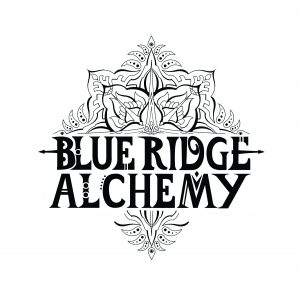
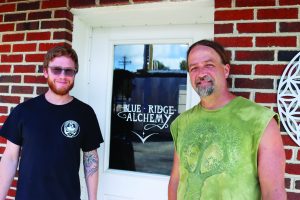 Blue Ridge Alchemy is owned and operated by Floyd locals, Kenan Tiemeyer of Shady Grove Homestead Arts, and Caleb Storm Dickman of Liquid Fire Glass. The shop is located at 115 Sweeney Street SE, near the heart of town; behind DJ’s Drive-In and along The Crooked Road – Virginia’s Heritage Music Trail. Blue Ridge Alchemy features live glass blowing, classes, bench rental, and a retail gallery space. While browsing, guests can watch glass creations being made before their eyes!
Blue Ridge Alchemy is owned and operated by Floyd locals, Kenan Tiemeyer of Shady Grove Homestead Arts, and Caleb Storm Dickman of Liquid Fire Glass. The shop is located at 115 Sweeney Street SE, near the heart of town; behind DJ’s Drive-In and along The Crooked Road – Virginia’s Heritage Music Trail. Blue Ridge Alchemy features live glass blowing, classes, bench rental, and a retail gallery space. While browsing, guests can watch glass creations being made before their eyes! Kenan has been working with flamework glass for over two decades. He grew up in Michigan and moved to the mountains of Floyd after earning his BS degree in Communications/Film and Video Production. Shortly after the move to Virginia, he married his wife, Tree. She is also a creative artisan who owns and operates The Enchanted Tree, which features her own glasswork, beadwork, woven items, and honey from the couple’s homestead hives.
Kenan has been working with flamework glass for over two decades. He grew up in Michigan and moved to the mountains of Floyd after earning his BS degree in Communications/Film and Video Production. Shortly after the move to Virginia, he married his wife, Tree. She is also a creative artisan who owns and operates The Enchanted Tree, which features her own glasswork, beadwork, woven items, and honey from the couple’s homestead hives. Over the past two decades, Kenan has been increasingly focused on creating ethereal scenes of energetic beauty that speak to the soul, utilizing vaporized pure gold and silver. His primary aim has been to create large, solid orbs and paperweights. Kenan has sold his work all over the world and has taught and exhibited throughout the USA, Japan, Canada, and France. After spending much of his career working alone in his secluded Indian Valley studio, he is thrilled to have a spacious studio and gallery in the town of Floyd. There, he can showcase his work to the public and teach the art of working with vaporized precious metals.
Over the past two decades, Kenan has been increasingly focused on creating ethereal scenes of energetic beauty that speak to the soul, utilizing vaporized pure gold and silver. His primary aim has been to create large, solid orbs and paperweights. Kenan has sold his work all over the world and has taught and exhibited throughout the USA, Japan, Canada, and France. After spending much of his career working alone in his secluded Indian Valley studio, he is thrilled to have a spacious studio and gallery in the town of Floyd. There, he can showcase his work to the public and teach the art of working with vaporized precious metals. Caleb pulls his inspiration from nature, music, visionary art, and crystals. His never-ending urge to combine materials into wearable, functionable art led to his craft of mixed media. He strives to make unique and rare pieces.
Caleb pulls his inspiration from nature, music, visionary art, and crystals. His never-ending urge to combine materials into wearable, functionable art led to his craft of mixed media. He strives to make unique and rare pieces.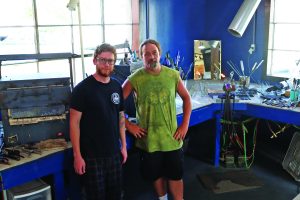 The old friends decided to collaborate on a new idea. They set out to create a unique environment in which to learn and teach new glass techniques while showcasing the beauty of functional and non-functional, borosilicate (Pyrex) glass art. Blue Ridge Alchemy features not only the art created by Kenan and Caleb, but also other local handmade art and novelties.One of the most exciting features of Blue Ridge Alchemy is the classes. Able to accommodate up to ten students at a time, the classes will range in skill level from beginner to advanced, covering a variety of different techniques. Beyond teaching their own classes, Kenan and Caleb are looking forward to hosting other teaching events for the public, featuring talented, well-known artists from around the country.
The old friends decided to collaborate on a new idea. They set out to create a unique environment in which to learn and teach new glass techniques while showcasing the beauty of functional and non-functional, borosilicate (Pyrex) glass art. Blue Ridge Alchemy features not only the art created by Kenan and Caleb, but also other local handmade art and novelties.One of the most exciting features of Blue Ridge Alchemy is the classes. Able to accommodate up to ten students at a time, the classes will range in skill level from beginner to advanced, covering a variety of different techniques. Beyond teaching their own classes, Kenan and Caleb are looking forward to hosting other teaching events for the public, featuring talented, well-known artists from around the country. Blue Ridge Alchemy will also host collaborative events that will feature Kenan and Caleb working in cooperation with other renowned glass artists to create collaborative bodies of work that will seem to be from out of this world! They hope these events will create more awareness for, and a better knowledge of, the styles and techniques preferred by different artisans.
Blue Ridge Alchemy will also host collaborative events that will feature Kenan and Caleb working in cooperation with other renowned glass artists to create collaborative bodies of work that will seem to be from out of this world! They hope these events will create more awareness for, and a better knowledge of, the styles and techniques preferred by different artisans.
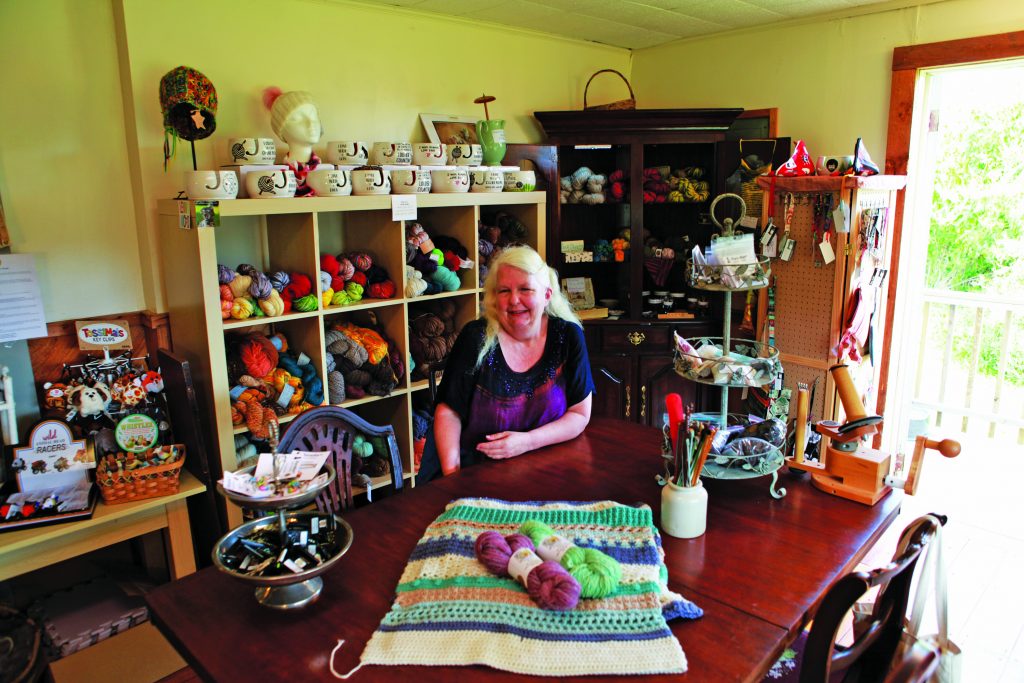
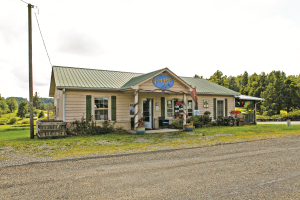 In 2005, Leslie and her partner, Ron Lawrence, opened a bookstore called Greenberry House, located in the same building that would one day become Poppy’s. Over the next fifteen years, Greenberry House grew, changed and adapted. It started as an antiquarian and used bookstore, but quickly branched out into a hand-spinning fiber and yarn shop.
In 2005, Leslie and her partner, Ron Lawrence, opened a bookstore called Greenberry House, located in the same building that would one day become Poppy’s. Over the next fifteen years, Greenberry House grew, changed and adapted. It started as an antiquarian and used bookstore, but quickly branched out into a hand-spinning fiber and yarn shop.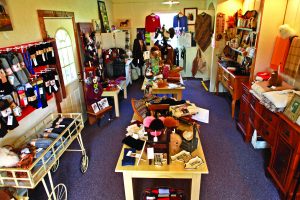 For those who came to know Leslie through Greenberry House, the tradition lives on at Poppy’s. Poppy’s still features a selection of handspun yarns and spinning fibers. Leslie also works with a number of other spinners in the area who sell their yarns through Poppy’s. The yarns are perfect for knitting and crochet projects and, unlike harshly processed commercial wools, are next-to-the-skin soft. Shoppers may even find a few fleeces for processing along with roving or batts; great for hand spinning or felting.
For those who came to know Leslie through Greenberry House, the tradition lives on at Poppy’s. Poppy’s still features a selection of handspun yarns and spinning fibers. Leslie also works with a number of other spinners in the area who sell their yarns through Poppy’s. The yarns are perfect for knitting and crochet projects and, unlike harshly processed commercial wools, are next-to-the-skin soft. Shoppers may even find a few fleeces for processing along with roving or batts; great for hand spinning or felting.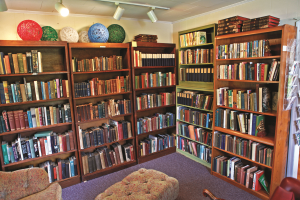 A cheerful name is fitting for this charming fiber, gift, and yarn shop in the tiny hamlet of Meadows of Dan. Poppy’s still has a vast selection of used and fine collectible books, including fiction, children’s books, religion, and folklore, but specializing in biography and history. The quality book selection is extensive, and Leslie continues to add more titles.
A cheerful name is fitting for this charming fiber, gift, and yarn shop in the tiny hamlet of Meadows of Dan. Poppy’s still has a vast selection of used and fine collectible books, including fiction, children’s books, religion, and folklore, but specializing in biography and history. The quality book selection is extensive, and Leslie continues to add more titles.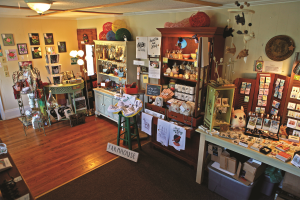 Sandra Hooper of The Alpaca Home Store has created an alpaca wonderland at Poppy’s, with a room full of quality alpaca garments, socks, toys, accessories, felted soaps, hats, gloves, ponchos, and more. Along with the luxury alpaca, Poppy’s offers elegant home décor gifts, quality souvenirs, and amazing handmade items.
Sandra Hooper of The Alpaca Home Store has created an alpaca wonderland at Poppy’s, with a room full of quality alpaca garments, socks, toys, accessories, felted soaps, hats, gloves, ponchos, and more. Along with the luxury alpaca, Poppy’s offers elegant home décor gifts, quality souvenirs, and amazing handmade items.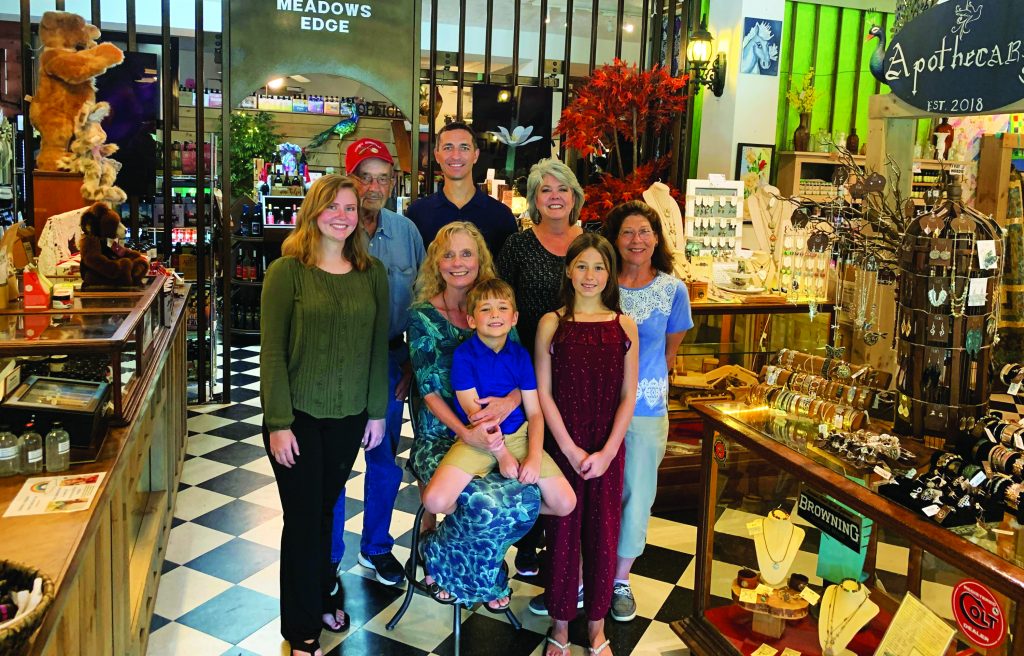
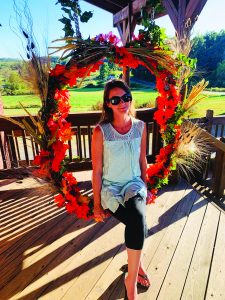 Tim Davis, originally from Floyd County, left his Lewisville, North Carolina teaching position in 2013 to move closer to home. There, he met Casey and the two were married. Within a few years, Tim and Casey, along with Felecia, found a historic brick building located 2554 Jeb Stuart Highway, near the Blue Ridge Parkway. The structure was empty and abandoned. It was also in a state of decline and disrepair. In 2016, the trio decided to take over the old building and preserve it. In less than two years, the trio became business partners, and on Good Friday, 2018, the Concord Corner Store opened its doors.
Tim Davis, originally from Floyd County, left his Lewisville, North Carolina teaching position in 2013 to move closer to home. There, he met Casey and the two were married. Within a few years, Tim and Casey, along with Felecia, found a historic brick building located 2554 Jeb Stuart Highway, near the Blue Ridge Parkway. The structure was empty and abandoned. It was also in a state of decline and disrepair. In 2016, the trio decided to take over the old building and preserve it. In less than two years, the trio became business partners, and on Good Friday, 2018, the Concord Corner Store opened its doors.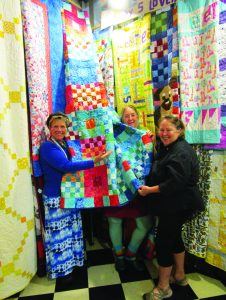 Concord Corner Store proudly features the products of sixty-nine craftspeople, artists, potters, jewelers, woodworkers, basket makers, and quilters from the immediate locality and surrounding areas. It really is a place where the craftsmanship, art, and creativity of the entire region comes together. With their own section at Concord, “Five Lovely Ladies”, a local quilters guild, work on and sell their beautiful quilts while meeting with customers.
Concord Corner Store proudly features the products of sixty-nine craftspeople, artists, potters, jewelers, woodworkers, basket makers, and quilters from the immediate locality and surrounding areas. It really is a place where the craftsmanship, art, and creativity of the entire region comes together. With their own section at Concord, “Five Lovely Ladies”, a local quilters guild, work on and sell their beautiful quilts while meeting with customers.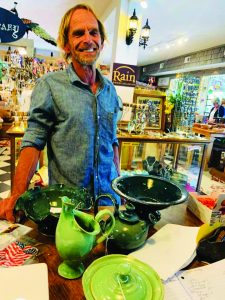 Visitors can also find fine pottery made by David Lunt of Stuart, as well as by Mike Gillette and Glenda McAlexander from Meadows of Dan. Rhonda Sowers from Floyd sells her handmade, early Appalachian style baskets while Penny Lane from Floyd sells unique jewelry made from tree fungus. Local ladies, Terry Turner and Lynn Boyd, also sell their jewelry. The Concord Corner Store also displays bird feeders and yard ornaments crafted from exquisite, antique glassware by Allen and Beverly Hairfield of Carrol County.
Visitors can also find fine pottery made by David Lunt of Stuart, as well as by Mike Gillette and Glenda McAlexander from Meadows of Dan. Rhonda Sowers from Floyd sells her handmade, early Appalachian style baskets while Penny Lane from Floyd sells unique jewelry made from tree fungus. Local ladies, Terry Turner and Lynn Boyd, also sell their jewelry. The Concord Corner Store also displays bird feeders and yard ornaments crafted from exquisite, antique glassware by Allen and Beverly Hairfield of Carrol County.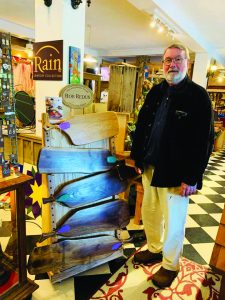 Rob Redus from Laurel Fork sells Charcuterie Boards; large wooden platters used for elaborate and elegant food displays. He crafts the boards from fine walnut and hickory. Bobby Nance from Henry County makes fine wooden items like cedar chests, toy boxes, birdhouses, and picture frames. Sue Troutman sells her fine dolls and Faye Crank from Meadows of Dan makes scrubbies by the hundreds, which she sells at a reasonable price.
Rob Redus from Laurel Fork sells Charcuterie Boards; large wooden platters used for elaborate and elegant food displays. He crafts the boards from fine walnut and hickory. Bobby Nance from Henry County makes fine wooden items like cedar chests, toy boxes, birdhouses, and picture frames. Sue Troutman sells her fine dolls and Faye Crank from Meadows of Dan makes scrubbies by the hundreds, which she sells at a reasonable price.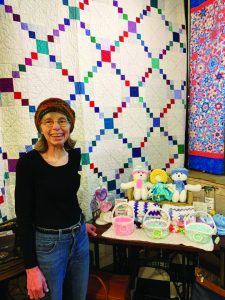
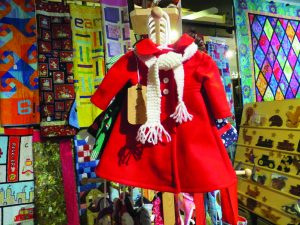
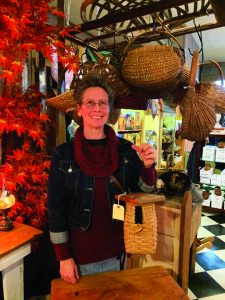
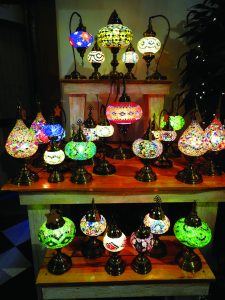 One of the most popular products at Concord Corner Store are the Turkish lamps. The Atthila family business was founded by the mother who, according to her sons, was the artsy one in the family. The family works with craftspeople all around Turkey, encouraging them to retain their traditional practices. Each of the lamps sold at Concord Corner Store is hand-designed in a home or small shop in Turkey. The lamps are created with tiny shards of reclaimed Turkish glass, arranged in the patterns of the ancient Persian rugs.
One of the most popular products at Concord Corner Store are the Turkish lamps. The Atthila family business was founded by the mother who, according to her sons, was the artsy one in the family. The family works with craftspeople all around Turkey, encouraging them to retain their traditional practices. Each of the lamps sold at Concord Corner Store is hand-designed in a home or small shop in Turkey. The lamps are created with tiny shards of reclaimed Turkish glass, arranged in the patterns of the ancient Persian rugs.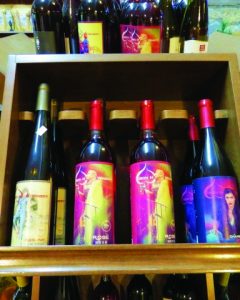 Casey and Felecia continue to look far and wide for unique, quality, Bohemian-style clothing to offer at Concord Corner Store. Shoppers can find several lines of occasional and specialty clothing for both men and women. There is much more to mention about the products at Concord Corner Store; fine soaps, craft beer, local wine, handmade bears from London, and much more. But it would be difficult because the store is always changing. The staff are always on the lookout for new, interesting, and unique things to offer.
Casey and Felecia continue to look far and wide for unique, quality, Bohemian-style clothing to offer at Concord Corner Store. Shoppers can find several lines of occasional and specialty clothing for both men and women. There is much more to mention about the products at Concord Corner Store; fine soaps, craft beer, local wine, handmade bears from London, and much more. But it would be difficult because the store is always changing. The staff are always on the lookout for new, interesting, and unique things to offer.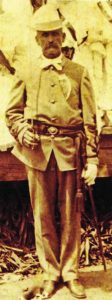
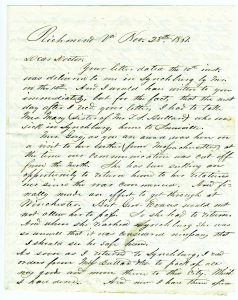
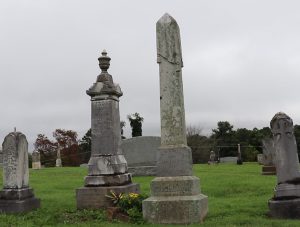 Stigleman loved the Union, and he loved the United States. It was this loyalty which drove him to heal the wounds of war until his death in 1905. He was a brilliant public speaker, calling on the nation to understand the forces and the love of home state which drove Confederate veterans to march to war. He spoke eloquently on several occasions about the patriotism that called northern men to war and mentioned how it was the same siren song to southern men.
Stigleman loved the Union, and he loved the United States. It was this loyalty which drove him to heal the wounds of war until his death in 1905. He was a brilliant public speaker, calling on the nation to understand the forces and the love of home state which drove Confederate veterans to march to war. He spoke eloquently on several occasions about the patriotism that called northern men to war and mentioned how it was the same siren song to southern men.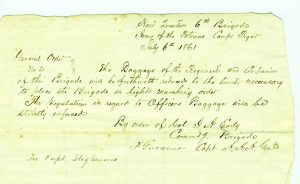 The Floyd County Historical Society is excited to announce that the Letters and Papers of Dr. Calohill Stigleman are being prepared for publication. The entire collection, including speeches he delivered late in life, will soon be available in a book, complete with essays explaining the people and events referenced within the letters.
The Floyd County Historical Society is excited to announce that the Letters and Papers of Dr. Calohill Stigleman are being prepared for publication. The entire collection, including speeches he delivered late in life, will soon be available in a book, complete with essays explaining the people and events referenced within the letters.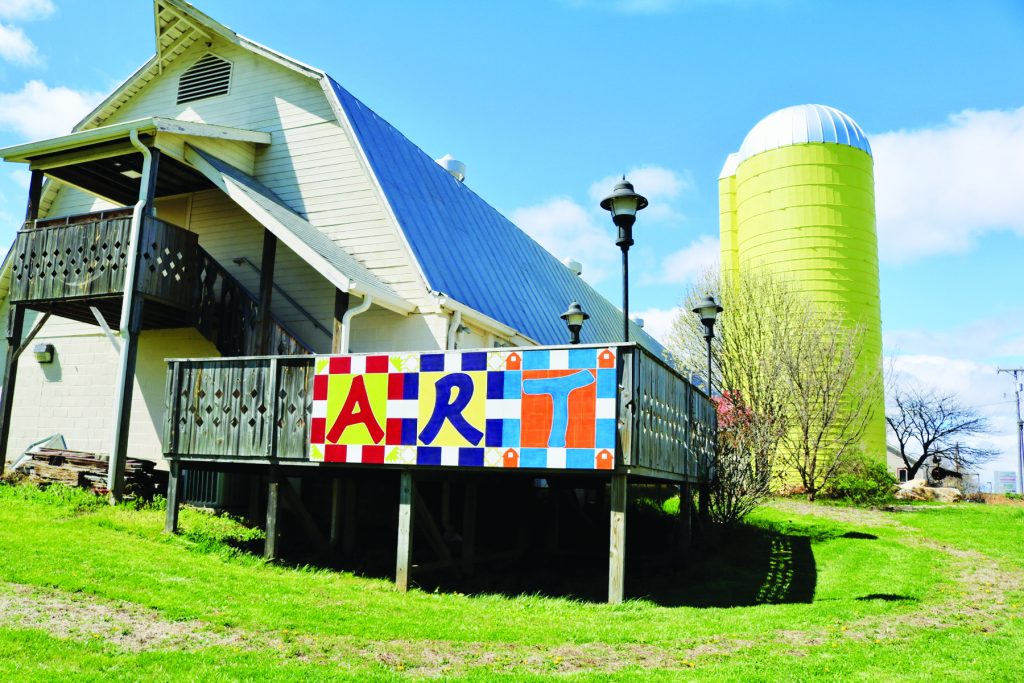
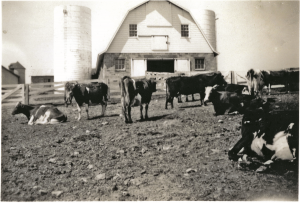 were met by long-time residents who had a heritage of music and craftsmanship. It was hoped the Old Jacksonville Barn would represent this melding of artistry. Established in 1995, it took a while for The Center to focus its mission, but the vision was always one that embraced a love of Floyd and combined it with a desire bring fun and the arts together.
were met by long-time residents who had a heritage of music and craftsmanship. It was hoped the Old Jacksonville Barn would represent this melding of artistry. Established in 1995, it took a while for The Center to focus its mission, but the vision was always one that embraced a love of Floyd and combined it with a desire bring fun and the arts together.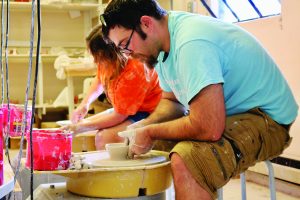 The barn’s first tenants moved in during 1995. There were photographers, painters, jewelers, woodworkers, and fiber artists, all hoping to produce and sell their creations. Community agencies also called The Jacksonville Center home.
The barn’s first tenants moved in during 1995. There were photographers, painters, jewelers, woodworkers, and fiber artists, all hoping to produce and sell their creations. Community agencies also called The Jacksonville Center home.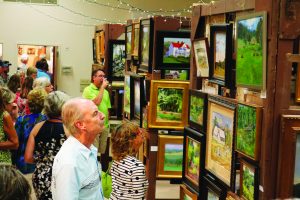 By 1999, a variety of exhibitions were held annually, featuring the paintings, photography, and crafts of Floyd County’s eclectic citizenry. The old barn itself, however, was in need of help.
By 1999, a variety of exhibitions were held annually, featuring the paintings, photography, and crafts of Floyd County’s eclectic citizenry. The old barn itself, however, was in need of help.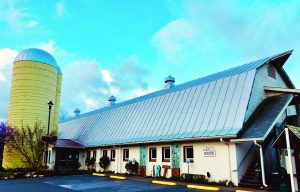 From 2000 to 2005, major improvements were made to the barn and adjacent buildings. Thanks to significant state and federal grants, as well as private funding, The Center renovated the barn and the site while also expanding its programs. Monies were invested in making the structure a functional facility that included amenities like accessibility for the handicapped, heating and plumbing, and the only elevator south of the town’s sole traffic light.
From 2000 to 2005, major improvements were made to the barn and adjacent buildings. Thanks to significant state and federal grants, as well as private funding, The Center renovated the barn and the site while also expanding its programs. Monies were invested in making the structure a functional facility that included amenities like accessibility for the handicapped, heating and plumbing, and the only elevator south of the town’s sole traffic light.
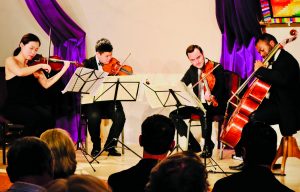 During this most recent series of improvements, the first House and Garden Tour, now in its sixth year, was organized as a fund-raising event. The Hayloft Gallery presented Rhythms of Glass, an exhibition of nationally known glass artists. This event was widely reported to have been one of the most impressive showcases ever held at The Center. The concert series, which actually began in 2007, continued to feature local, national, and international performers at least four times a year, often more.
During this most recent series of improvements, the first House and Garden Tour, now in its sixth year, was organized as a fund-raising event. The Hayloft Gallery presented Rhythms of Glass, an exhibition of nationally known glass artists. This event was widely reported to have been one of the most impressive showcases ever held at The Center. The concert series, which actually began in 2007, continued to feature local, national, and international performers at least four times a year, often more.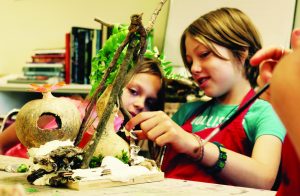 Proudly displaying its new name, The Floyd Center for the Arts now offers a myriad of art classes, both juried and curated art shows, classical and jazz music concerts, the Floyd County House & Garden Tour, and the biennial Floyd Plein Air Festival which draws nationally recognized artists to the county. The Center also assists in leading major efforts like the annual Floyd Artisan Trail Tour, the weekly Floyd Artisan Market, and new this year, the Floyd Gallery Walk tour.
Proudly displaying its new name, The Floyd Center for the Arts now offers a myriad of art classes, both juried and curated art shows, classical and jazz music concerts, the Floyd County House & Garden Tour, and the biennial Floyd Plein Air Festival which draws nationally recognized artists to the county. The Center also assists in leading major efforts like the annual Floyd Artisan Trail Tour, the weekly Floyd Artisan Market, and new this year, the Floyd Gallery Walk tour.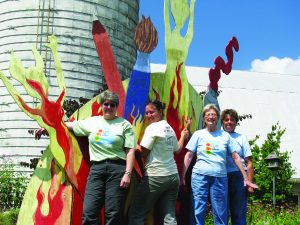 so many improvements and upgrades since those earliest days, Executive Director Liverman is looking forward to the future. “Awareness is one of our biggest challenges. The Floyd Center for the Arts has a huge array of offerings from classes and workshops to festivals and concerts,” he points out. “We want to serve even more of our community and visitors to Floyd. We have faced many challenges over the last twenty-five years and emerged stronger for it.”
so many improvements and upgrades since those earliest days, Executive Director Liverman is looking forward to the future. “Awareness is one of our biggest challenges. The Floyd Center for the Arts has a huge array of offerings from classes and workshops to festivals and concerts,” he points out. “We want to serve even more of our community and visitors to Floyd. We have faced many challenges over the last twenty-five years and emerged stronger for it.”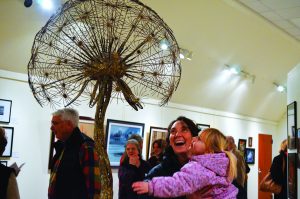 “The Center had planned to invite the community to celebrate our 25th anniversary,” Fallon continues, “but the Coronavirus intervened. We have a lot of accomplishments over the last quarter-century to be proud of, and we look forward to presenting more exciting art, classes, programs, and music. No matter what one’s age or interest, for twenty-five years, The Center has had something to offer all. It is a jewel, and one that I am proud to be associated with.”
“The Center had planned to invite the community to celebrate our 25th anniversary,” Fallon continues, “but the Coronavirus intervened. We have a lot of accomplishments over the last quarter-century to be proud of, and we look forward to presenting more exciting art, classes, programs, and music. No matter what one’s age or interest, for twenty-five years, The Center has had something to offer all. It is a jewel, and one that I am proud to be associated with.”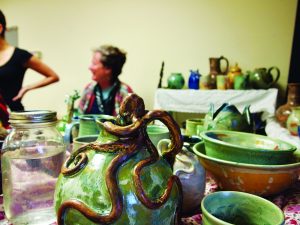
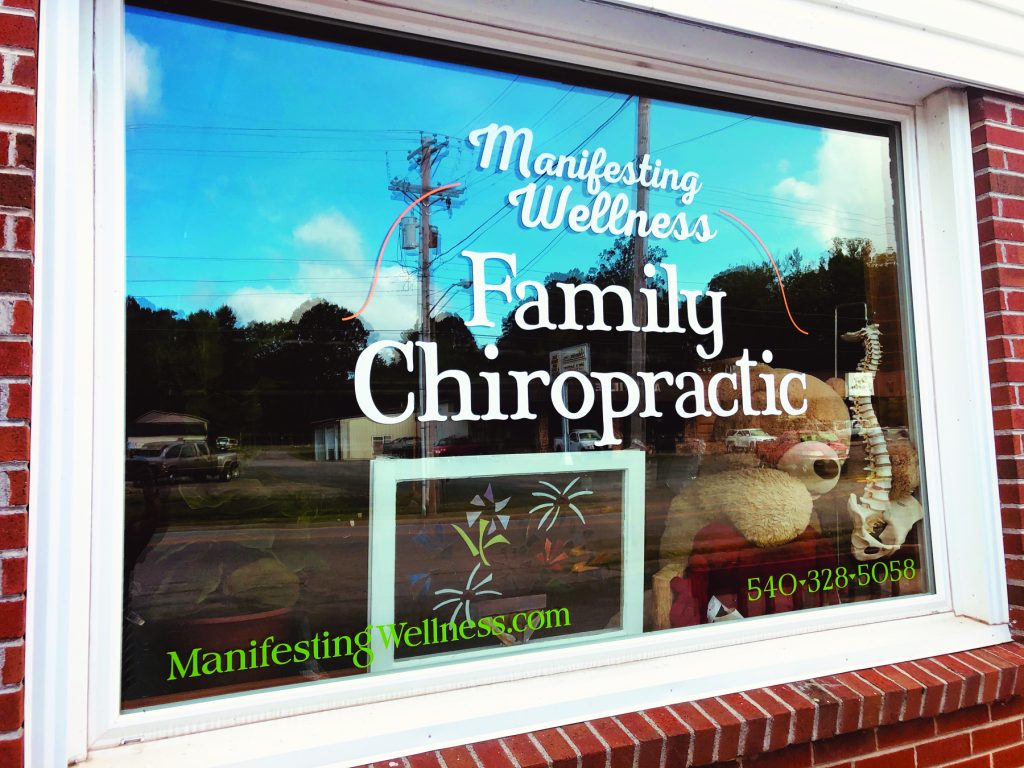
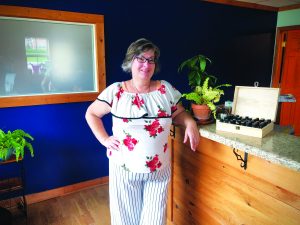 Consequently, she made the decision to open a family-centered chiropractic office in Floyd. On February 1 of 2019, she saw her first patient in a small, basement office below the Montessori school on West Main Street. Just a year later, in April of 2020, she upgraded and moved her office, Manifesting Wellness Family Chiropractic, to its current location at 613 East Main Street, next to Floyd Xpress Market.
Consequently, she made the decision to open a family-centered chiropractic office in Floyd. On February 1 of 2019, she saw her first patient in a small, basement office below the Montessori school on West Main Street. Just a year later, in April of 2020, she upgraded and moved her office, Manifesting Wellness Family Chiropractic, to its current location at 613 East Main Street, next to Floyd Xpress Market.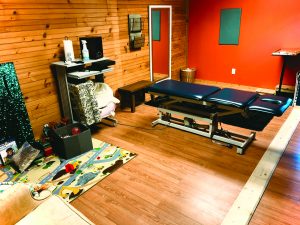 Unlike the lengthy sessions some patients might experience in other chiropractic offices, Dr. Alba routinely needs only twenty to thirty minutes during each visit to perform the needed treatment. New patients, however, receive approximately two hours of her undivided attention.
Unlike the lengthy sessions some patients might experience in other chiropractic offices, Dr. Alba routinely needs only twenty to thirty minutes during each visit to perform the needed treatment. New patients, however, receive approximately two hours of her undivided attention.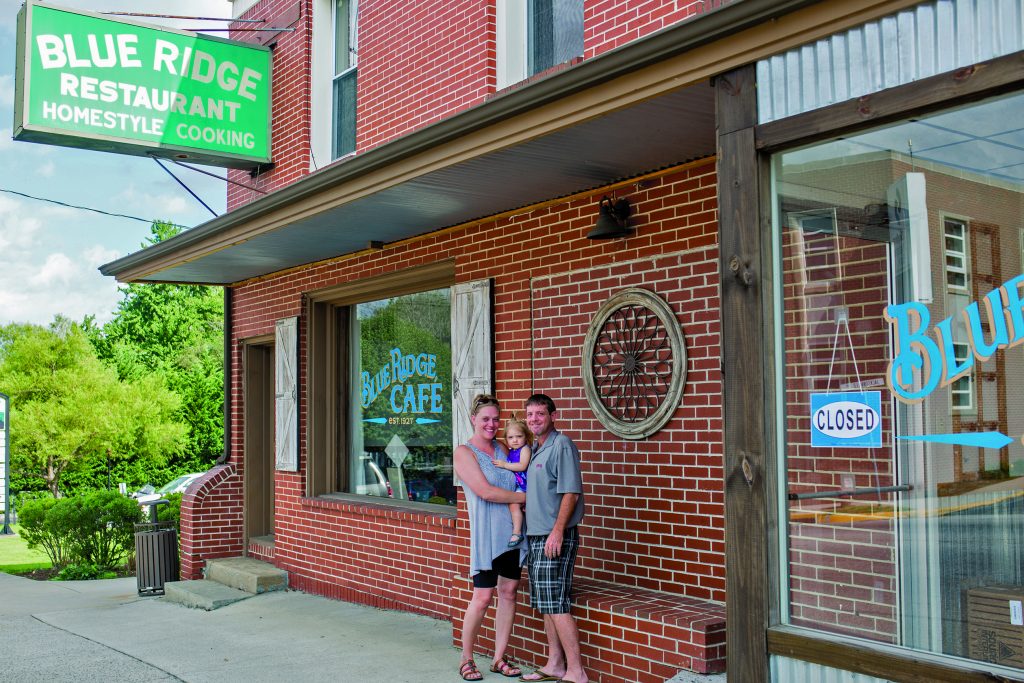
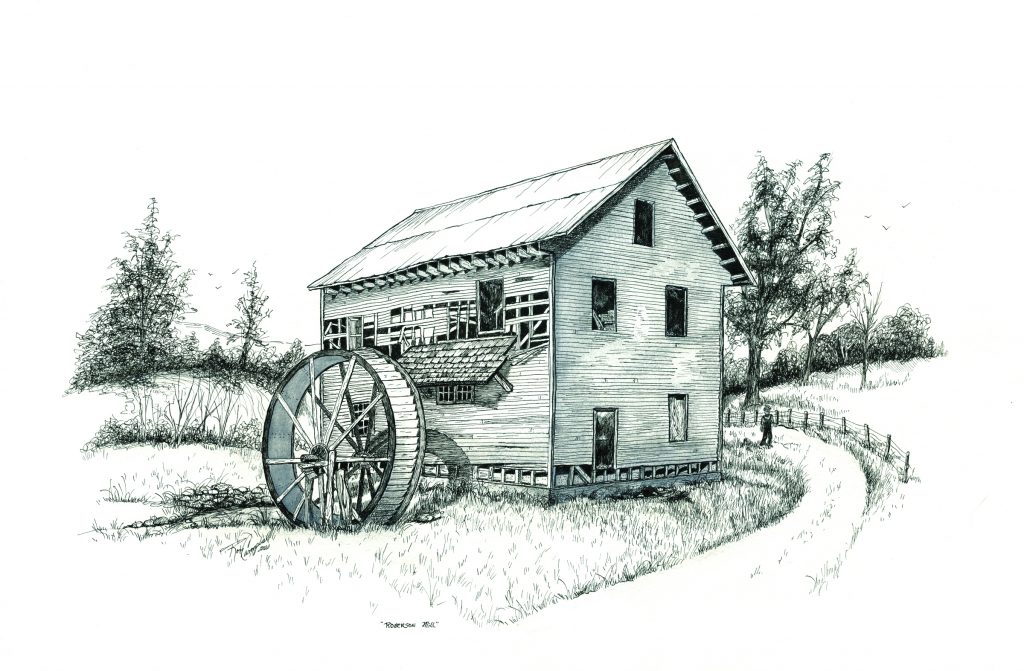
 The exception, however, is a historic building with which I recently became acquainted. It once served not only the town of Floyd, but also many more neighboring southwest Virginia counties, reaching as far south as North Carolina.
The exception, however, is a historic building with which I recently became acquainted. It once served not only the town of Floyd, but also many more neighboring southwest Virginia counties, reaching as far south as North Carolina.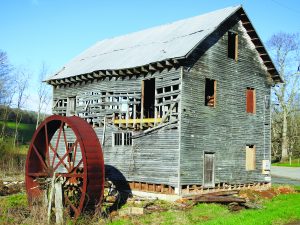 Here, I not only read about the mill’s history, but also stumbled upon an interesting story about the mission of a lady named Regina Cox. Regina is not only a native of Floyd, but also the daughter of Harry Roberson. Her father recently deeded her the acreage, along with the mill, which currently sits decaying by the creek on Roberson Mill Road. Wanting to keep the rain out, and also wanting to keep the mill from falling into the road, Regina set her sights on reversing this decay.
Here, I not only read about the mill’s history, but also stumbled upon an interesting story about the mission of a lady named Regina Cox. Regina is not only a native of Floyd, but also the daughter of Harry Roberson. Her father recently deeded her the acreage, along with the mill, which currently sits decaying by the creek on Roberson Mill Road. Wanting to keep the rain out, and also wanting to keep the mill from falling into the road, Regina set her sights on reversing this decay.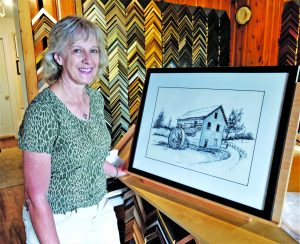 and inks. If the drawing could capture the spirit of the mill, I could donate it to help raise money. I could also donate further to the cause by a pledging a portion of the sales of the prints. I presented the offer to Regina and she liked it.
and inks. If the drawing could capture the spirit of the mill, I could donate it to help raise money. I could also donate further to the cause by a pledging a portion of the sales of the prints. I presented the offer to Regina and she liked it. I rode by the mill today (August 25th) and all four sides have been closed to the weather. There is much left to be done before Roberson Mill and its historical value can be appreciated by the public. Most of the parts and pieces remain.
I rode by the mill today (August 25th) and all four sides have been closed to the weather. There is much left to be done before Roberson Mill and its historical value can be appreciated by the public. Most of the parts and pieces remain.
 The building that housed the general store had an apartment on the second floor where the family made their home. This is where baby Mary spent the first eighteen months of her life while her parents were busy downstairs. One day, however, little Mary had an adventure. She got tired of staying in her baby bed, so decided to get up and move around. Ruby had heard her daughter walking about, and it was decided that Mary might best off downstairs. Though Mary spent more and more time with her parents in the store, she could still be spotted occasionally looking out of the upstairs window. Mary fondly remembers her mother telling her how everyone in Floyd would wave at her as they passed by. When Mary was five years old, Douglas and Ruby had their hands full. In addition to running a business, they also had to keep their eyes on a mischievous little girl. For a laugh, Mary recalls she would sometimes sneak into the back to smash the farm-fresh eggs on the cement floor. She would also tear holes in the loaves of bread.
The building that housed the general store had an apartment on the second floor where the family made their home. This is where baby Mary spent the first eighteen months of her life while her parents were busy downstairs. One day, however, little Mary had an adventure. She got tired of staying in her baby bed, so decided to get up and move around. Ruby had heard her daughter walking about, and it was decided that Mary might best off downstairs. Though Mary spent more and more time with her parents in the store, she could still be spotted occasionally looking out of the upstairs window. Mary fondly remembers her mother telling her how everyone in Floyd would wave at her as they passed by. When Mary was five years old, Douglas and Ruby had their hands full. In addition to running a business, they also had to keep their eyes on a mischievous little girl. For a laugh, Mary recalls she would sometimes sneak into the back to smash the farm-fresh eggs on the cement floor. She would also tear holes in the loaves of bread. In 1974, a small rack of dresses was added to the beauty shop. Ruby had often mentioned how much she thought she’d like to sell clothing, and since this mother and daughter were a team, Mary agreed. After obtaining a four-foot rack and a selection of dresses from various clothing factories, the Little Dress Shop was born.
In 1974, a small rack of dresses was added to the beauty shop. Ruby had often mentioned how much she thought she’d like to sell clothing, and since this mother and daughter were a team, Mary agreed. After obtaining a four-foot rack and a selection of dresses from various clothing factories, the Little Dress Shop was born. If a beauty shop, a growing clothing business, and a new family wasn’t enough to keep Mary busy, her husband, Bobby, decided to purchase the big house at 202 East Oxford Street, just behind the Courthouse in downtown Floyd. Bobby Gardner purchased the house in 1977 with the intention of making a home for his family on the upper level while renting the lower level as an apartment. Just a year later, however, the decision was made to convert the stately house into a funeral home. With only a year of preparation, Gardner Funeral Home was ready to serve the public in 1979.
If a beauty shop, a growing clothing business, and a new family wasn’t enough to keep Mary busy, her husband, Bobby, decided to purchase the big house at 202 East Oxford Street, just behind the Courthouse in downtown Floyd. Bobby Gardner purchased the house in 1977 with the intention of making a home for his family on the upper level while renting the lower level as an apartment. Just a year later, however, the decision was made to convert the stately house into a funeral home. With only a year of preparation, Gardner Funeral Home was ready to serve the public in 1979. Meanwhile, back at the beauty shop in 1990, Mary decided to close the business and use the space to expand even further with the dresses. The clothing had become so popular that Ruby and Mary wanted to focus on just The Little Dress Shop. The mother and daughter team ran the expanded dress shop as a duo until 1993. That was when Mary’s daughter,
Meanwhile, back at the beauty shop in 1990, Mary decided to close the business and use the space to expand even further with the dresses. The clothing had become so popular that Ruby and Mary wanted to focus on just The Little Dress Shop. The mother and daughter team ran the expanded dress shop as a duo until 1993. That was when Mary’s daughter,  Elizabeth Reynolds, who had been working in Roanoke, continued the family tradition by coming to work with her mother and grandmother. History repeated itself once again. Elizabeth’s children were also now spending their childhood at 214 Floyd Highway South.
Elizabeth Reynolds, who had been working in Roanoke, continued the family tradition by coming to work with her mother and grandmother. History repeated itself once again. Elizabeth’s children were also now spending their childhood at 214 Floyd Highway South. Stacy ran her shop, Sheer Elegance, until health issues forced her to close. Even today, however, 214 Floyd Highway South persists in being a beauty shop! It is now Gussied Up, run by Miranda Bolt.
Stacy ran her shop, Sheer Elegance, until health issues forced her to close. Even today, however, 214 Floyd Highway South persists in being a beauty shop! It is now Gussied Up, run by Miranda Bolt. In order to liquidate the remaining stock, Mary and Elizabeth decided to move selections of seasonal merchandise to a temporary location closer to downtown. Mary’s father, Douglas Gray, had purchased the small storefront at 111 West Main Street in the 1940’s. Mary recalls that her father walked all the way to Hillsville to make the purchase! Douglas Gray had passed away in 1998, but Mary remembers him fondly as a remarkable salesman. Before buying the general store, he’d been a “huckster”, going door to door with flour, sugar and other items. He would also pick up hams, chickens, eggs, and other goods from the farmers to then sell in Roanoke. Mary chuckles at the story she was told about her father’s aunt sending him candy from Chicago, which he then took to school and sold to the other children. He was a salesman all his life and loved helping the community.
In order to liquidate the remaining stock, Mary and Elizabeth decided to move selections of seasonal merchandise to a temporary location closer to downtown. Mary’s father, Douglas Gray, had purchased the small storefront at 111 West Main Street in the 1940’s. Mary recalls that her father walked all the way to Hillsville to make the purchase! Douglas Gray had passed away in 1998, but Mary remembers him fondly as a remarkable salesman. Before buying the general store, he’d been a “huckster”, going door to door with flour, sugar and other items. He would also pick up hams, chickens, eggs, and other goods from the farmers to then sell in Roanoke. Mary chuckles at the story she was told about her father’s aunt sending him candy from Chicago, which he then took to school and sold to the other children. He was a salesman all his life and loved helping the community. The storefront at 111 West Main has had multiple tenants over the years. Early on, it was a thrift store for the Save the Children Federation. Among other incarnations, it was also a seamstress shop for Velma Spangler, a sewing machine repair shop run by Tyler Turner, a carpet shop run by Donny Black, and an antique shop run by Melody Winger.
The storefront at 111 West Main has had multiple tenants over the years. Early on, it was a thrift store for the Save the Children Federation. Among other incarnations, it was also a seamstress shop for Velma Spangler, a sewing machine repair shop run by Tyler Turner, a carpet shop run by Donny Black, and an antique shop run by Melody Winger. The old feed building location stores only a fraction of the inventory it once held. Not wanting to let the space go to waste, Mary has recently remodeled and split it into three beautiful spaces. One is occupied by a florist called Tilted Tulip, run by Melissa Goad. The second space will soon be available for rent, and the third will continue, for now, as a storage location for The Little Dress Shop’s remaining inventory.
The old feed building location stores only a fraction of the inventory it once held. Not wanting to let the space go to waste, Mary has recently remodeled and split it into three beautiful spaces. One is occupied by a florist called Tilted Tulip, run by Melissa Goad. The second space will soon be available for rent, and the third will continue, for now, as a storage location for The Little Dress Shop’s remaining inventory.